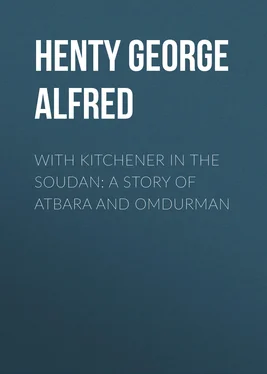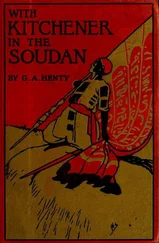George Henty - With Kitchener in the Soudan - A Story of Atbara and Omdurman
Здесь есть возможность читать онлайн «George Henty - With Kitchener in the Soudan - A Story of Atbara and Omdurman» — ознакомительный отрывок электронной книги совершенно бесплатно, а после прочтения отрывка купить полную версию. В некоторых случаях можно слушать аудио, скачать через торрент в формате fb2 и присутствует краткое содержание. Жанр: Прочие приключения, Прочие приключения, foreign_antique, foreign_prose, foreign_children, на английском языке. Описание произведения, (предисловие) а так же отзывы посетителей доступны на портале библиотеки ЛибКат.
- Название:With Kitchener in the Soudan: A Story of Atbara and Omdurman
- Автор:
- Жанр:
- Год:неизвестен
- ISBN:нет данных
- Рейтинг книги:5 / 5. Голосов: 1
-
Избранное:Добавить в избранное
- Отзывы:
-
Ваша оценка:
- 100
- 1
- 2
- 3
- 4
- 5
With Kitchener in the Soudan: A Story of Atbara and Omdurman: краткое содержание, описание и аннотация
Предлагаем к чтению аннотацию, описание, краткое содержание или предисловие (зависит от того, что написал сам автор книги «With Kitchener in the Soudan: A Story of Atbara and Omdurman»). Если вы не нашли необходимую информацию о книге — напишите в комментариях, мы постараемся отыскать её.
With Kitchener in the Soudan: A Story of Atbara and Omdurman — читать онлайн ознакомительный отрывок
Ниже представлен текст книги, разбитый по страницам. Система сохранения места последней прочитанной страницы, позволяет с удобством читать онлайн бесплатно книгу «With Kitchener in the Soudan: A Story of Atbara and Omdurman», без необходимости каждый раз заново искать на чём Вы остановились. Поставьте закладку, и сможете в любой момент перейти на страницу, на которой закончили чтение.
Интервал:
Закладка:
"It was here," the officer said, "that the North Staffordshires came up and joined the Egyptians. The Dervishes had fallen back before we advanced, after a halt at Sadeah, which we sha'n't see, as the railway cuts across, to Abu Fetmeh. We bivouacked five miles from their camp, and turned out at three next morning. The orders were passed by mouth, and we got off as silently as an army of ghosts.
"I shall never forget our disgust when a small cavalry force, sent on ahead to reconnoitre, reported that the Dervishes had abandoned the place during the night, and had crossed the river in native boats. It was a very clever move, at any rate, on the part of fellows who did not want to fight. There were we facing them, with our whole infantry and cavalry useless, and we had nothing available to damage the enemy except our artillery and the gunboats.
"These opened fire, and the Dervishes replied heavily. They had earthworks, but the boats kept on, pluckily, till they got to a narrow point in the stream; when a couple of guns, which had hitherto been hidden, opened upon them at close range; while a strong force of Dervish infantry poured in such a hot fire that the boats had to fall back.
"After our field guns had peppered the enemy for a bit, the gunboats tried again, but the fire was too hot for them, and the leading boat had to retire.
"Things did not look very bright, till nine o'clock; when we found that, at one point, the river was fordable to a small island, opposite the enemy's lines. Four batteries, and the Maxims, at once moved over, with two companies of Soudanese, and opened fire. The distance across was but six hundred yards, and the fire was tremendous–shell, shrapnel, and rockets–while the Soudanese fired volleys, and the Maxims maintained a shower of bullets.
"It seemed that nothing could stand against it, but the Dervishes stuck to their guns with great pluck. However, their fire was so far kept down, that the three gunboats succeeded in forcing their way up; and, passing the Dervish works, sank a steamer and a number of native boats.
"The Dervishes now began to give way, and the gunboats steamed up the river, making for Dongola. The Dervishes, as soon as they had gone, reopened fire, and the duel continued all day; but the great mass of the enemy soon left, and also made their way towards Dongola.
"It was awfully annoying being obliged to remain inactive, on our side, and it was especially hard for the cavalry; who, if they could have got over, would have been able to cut up and disperse the enemy.
"The next morning the Dervishes were all gone, and that was practically the end of the fighting. The gunboats went up and shelled Dongola; and when we got there, two days later, the Dervishes had had enough of it. Of course, there was a little fighting, but it was the effort of a party of fanatics, rather than of an enemy who considered resistance possible.
"We were greeted with enthusiasm by the unfortunate inhabitants, who had been subject to the Dervish tyranny. As a whole, however, they had not been badly treated here, and had been allowed to continue to cultivate their land, subject only to about the same taxation as they had paid to Egypt. Of course, from what they have done elsewhere, the comparative mildness of the conduct of the Dervishes was not due to any feeling of mercy, but to policy. As the most advanced position, with the exception of scattered and temporary posts lower down the river, it was necessary that there should be food for the considerable body of tribesmen encamped at Dongola; especially as an army invading Egypt would provide itself, there, with stores for the journey. It was therefore good policy to encourage the cultivators of land to stay there."
"Thank you very much!" Gregory said, when the officer had concluded his sketch of the previous campaign. "Of course, I heard that we had beaten the Khalifa's men, and had taken Dongola, but the papers at Cairo gave no details. The Staffordshire regiment went down, directly the place was taken, did they not?"
"Yes. They had suffered heavily from cholera; and as there was now no fear that the Egyptians and Soudanese would prove unequal to withstanding a Dervish rush, there was no necessity for keeping them here."
At Abu Fetmeh they left the train, and embarked in a steamer. Of the party that had left Assouan, only four or five remained. The rest had been dropped at other stations on the road.
The boat stopped but a few hours at Dongola, which had for a time been the headquarters of the advanced force. Great changes had been made, since the place was captured from the Dervishes. At that time the population had been reduced to a handful, and the natives who remained tilled but enough ground for their own necessities; for they knew that, at any time, a Dervish force might come along and sweep everything clear. But with the advent of the British, the fugitives who had scattered among the villages along the river soon poured in.
Numbers of Greek traders arrived, with camels and goods, and the town assumed an aspect of life and business. The General established a court of justice, and appointed authorities for the proper regulation of affairs; and by the time Gregory came up, the town was showing signs of renewed prosperity.
But the steamer stopped at Dongola only to land stores needed for the regiment stationed there. The headquarters had, months before, been moved to Merawi, some eighty miles higher up, situated at the foot of the fourth cataract.
Although he had enjoyed the journey, Gregory was glad when the steamer drew up against a newly constructed wharf at Merawi. Now he was to begin his duties, whatever they might be.
At the wharf were a large number of Soudanese soldiers. A telegram, from the last station they touched at, had given notice of the hour at which the boat would arrive; and a battalion of native troops had marched down, to assist in unloading the stores. A white officer had come down with them, to superintend the operation, and the other officers at once went on shore to speak to him.
Gregory had got all his traps together and, as the Soudanese poured on board, he thought it better to remain with them; as, if his belongings once got scattered, there would be little chance of his being able to collect them again. After a short time, he went up to one of the native officers.
"This is my first visit here," he said in Arabic, "and as I have not brought up a servant with me, I do not like to leave my baggage here, while I go and report myself to General Hunter. Will you kindly tell me what I had better do?"
"Certainly. I will place one of my corporals in charge of your things. It would be as well to get them ashore at once, as we shall want the decks clear, in order that the men may work freely in getting the stores up from below. The corporal will see that your baggage is carried to the bank, to a spot where it will be out of the way, and will remain with it until you know where it is to be taken."
Thanking him for his civility, Gregory went on shore. The officer who had told him the story of the campaign was still talking, to the Major who had come down with the blacks. As Gregory came up, he said:
"I wondered what had become of you, Hilliard. I have been telling Major Sidney that a young lieutenant had come up, to report himself to the General for service."
"I am glad to see you, sir," the Major said, holding out his hand. "Every additional white officer is a material gain, and I have no doubt that General Hunter will find plenty for you to do. I hear you can speak the Negro language, as well as Arabic. That will be specially useful here, for the natives are principally Negro, and speak very little Arabic.
"How about your baggage?"
"One of the native officers has undertaken to get it ashore, and to put a corporal in charge of it, until I know where it is to go."
Читать дальшеИнтервал:
Закладка:
Похожие книги на «With Kitchener in the Soudan: A Story of Atbara and Omdurman»
Представляем Вашему вниманию похожие книги на «With Kitchener in the Soudan: A Story of Atbara and Omdurman» списком для выбора. Мы отобрали схожую по названию и смыслу литературу в надежде предоставить читателям больше вариантов отыскать новые, интересные, ещё непрочитанные произведения.
Обсуждение, отзывы о книге «With Kitchener in the Soudan: A Story of Atbara and Omdurman» и просто собственные мнения читателей. Оставьте ваши комментарии, напишите, что Вы думаете о произведении, его смысле или главных героях. Укажите что конкретно понравилось, а что нет, и почему Вы так считаете.












